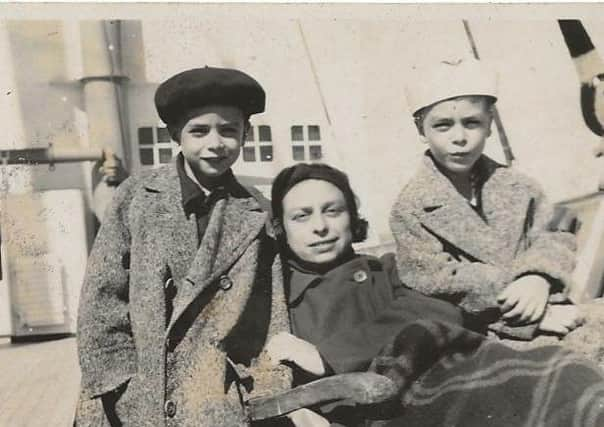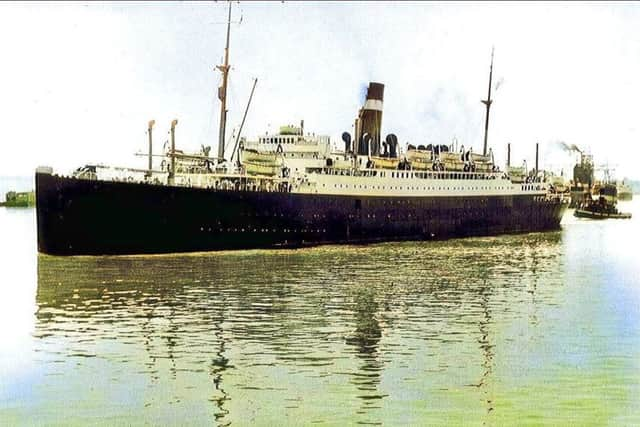Uncovered testimony shows the horror of attack on SS Athenia during Battle of the Atlantic


When he was nine, Danny Wilkes almost trod on a poisonous snake as he ran towards the swimming hole at the Connecticut farm where he and his family were staying. As he crossed a muddy path he saw the snake with – as he would write years later – “the triangular head and markings… [of] a copperhead.”
Terrified, Wilkes took flight, looking back to realise the snake was as scared as he was since it was “beating a path in the opposite direction”.
Advertisement
Hide AdAdvertisement
Hide AdYet he retained the mental connection between snakes and water for years, refusing to learn to swim properly till he was 13.


It’s an intriguing example of how a child’s memory works, and how phobias are formed. Intriguing, not least, that Wilkes remembered it at all, since he would shortly have a far more dramatic near-death experience involving water.
That same summer holiday, his parents took their two sons by ship to Scotland, where Wilkes’ father, Edward, a New York paediatrician, was to attend a conference.
It was 1939, and the whole world was about to change, but Edward calculated that Britain would do anything to avoid being dragged into the war against Hitler.
That calculation led directly to Danny Wilkes ending up on the first ship to be torpedoed in the Battle of the Atlantic.
The battle, which began 80 years ago this autumn, was the longest sustained campaign by the Germans against the Allies; 3,500 allied merchant ships and 175 warships would be sunk.
Churchill, then First Lord of the Admiralty, recognised the full magnitude of the U-boat peril, since it threatened the lifeline of food and military supplies sent from the US.
In his memoirs he wrote that it was “the only thing that really frightened me in the war”.
Advertisement
Hide AdAdvertisement
Hide AdWilkes’ story – never made public before – of how he lived through that first attack is an extraordinary account of survival.
Like so many children, he found himself caught up in scenes of apocalyptic devastation that would mark him for the rest of his life.
The most distressing involved his mother, Tilda, who was disabled as a result of a post-partum stroke that she had had in 1931, eight weeks after giving birth to his brother Jonty. As they got on the ship to return to America from Glasgow after their holiday,
Wilkes heard a newsboy shouting “War! War!”.
For the small boys, this brought a frisson of drama to an already exciting voyage; for their mother, the stress kept her confined to bed in her cabin.
Poignantly Wilkes writes that on the evening of the attack, “The sun was on the starboard with some clouds glowing red.
Thus the ship was silhouetted, outlined to the U-boat sighting on it from our port side.” It’s a crucial detail, because the U-boat commander Fritz Julius Lemp would claim later that he thought the ship was an “armed cruiser”, and therefore fair game.
Yet the attack was a clear violation of international protocol. “The superstructure was so definitely signifying a passenger vessel, not a merchantman,” declares Wilkes, “that even if the U-30 had not been shadowing the ship for two to three hours, the Germans could not have been under any illusion.”
At 7:20pm, Wilkes went to the cabin where his mother was.
He was sitting on the edge of his bunk when a thud jolted the whole ship and the light in their cabin went out.
Advertisement
Hide AdAdvertisement
Hide AdHis mother screamed, “We’ve been torpedoed”. Looking around Wilkes noticed, first, that there was water rising up in the cabin, and second, that a metal locker had fallen across the door, trapping them inside.
For a child it was an almost impossible physical challenge to shift it.
His mother couldn’t lift herself from her bed.
Desperately trying to save them, he wrestled frantically to get the locker away from the door, but it wouldn’t budge. Up and up the water levels rose. Devastatingly, he recalled, “The water was at my waist when I heard a gurgle. I turned around and never spoke to her again.”
There was no time for the luxury of grief.
With the water levels still rising he was forced to get straight back up on the bunk board.
When the water was so high that he had to tilt his head back to keep his nose above water level, the door came open by just a few inches. Squeezing his ribcage to make himself as small as possible, he edged through.
Up on C-Deck the crew were evacuating the passengers.
In the eddy and swirl of events there was no opportunity for Wilkes to work out where his father or brother were.
Before he knew it he was in a lifeboat: then the evening took on a new rhythm as men at the oars rowed as fast as they could away from the sinking ship so they didn’t get sucked into the undertow as it went down.
Decades later, he would write, “I was in a way beyond fear, expecting each wave might be the end of us.”
Advertisement
Hide AdAdvertisement
Hide AdIn the dark, they saw the lights of a British destroyer searching the waters.
It was a way off, but after a time a motor launch approached. The seaman in it explained that they had to pick up people floating in the water first, but once they’d done this, they would return for them.
In the next stage of his extraordinary odyssey, the destroyer – called Electra – took Wilkes, along with everyone else they had picked up, to Glasgow.
One of the crew members, taking pity on the boy, let him up onto the deck so he could see other crew members attacking a U-boat. “I was thrilled,” Wilkes recounted, “especially as I knew [he] was breaking the rules by letting me on deck during combat.”
Only days before he and his family had been holidaying in Scotland. When he arrived back in Glasgow, it was as if he were in a different world, one in which he was now alone.
At a survivors’ dinner organised by the Lord Provost in a Glasgow hotel, Wilkes heard a loud crash and – thinking it was a bomb – dived under the table.
The people in the dining room who rushed to the window could see that in fact it was a truck outside dropping a load of lumber.
But a young female volunteer, Jean Miller, was struck to the core by what she’d witnessed of Wilkes’ terror.
Advertisement
Hide AdAdvertisement
Hide AdGrabbing him she told him that she was taking him home rather than leaving him to social services.
It was an act of enormous kindness. But because of it Wilkes was never registered on the list of survivors.
A series of remarkable word-of-mouth coincidences eventually reunited him with his father.
Inevitably the reunion was freighted with sadness since he discovered that not just his mother but his brother had died.
Of the memories that would torment him till his own death in 2016, the worst were those terrible moments trapped in the cabin with his dying mother. In his account, he confides that initially he couldn’t even talk about it properly to his father.
“We never spoke of it again,” he wrote, “until nine years later on my 18th birthday.”